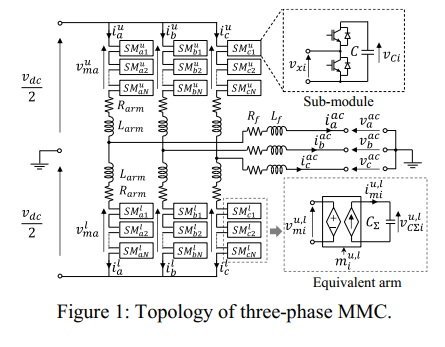A New Energy Management Control of Modular Multilevel Converters
for Coping with Voltage Stress on Sub-Modules

Abstract
Propelled by the remarkable advancement of power electronic devices, High-Voltage Direct Current (HVDC) transmission has led to their use in practical applications under circumstances where the conventional AC technology is either technically infeasible or economically unattractive, such as longdistance power transfer and offshore wind farm connection. Among the various Voltage Source Converter (VSC) technologies, the presently preferred one is the Modular Multilevel Converter (MMC), which enjoys a number of advantages over the conventional 2-level VSC, such as lower switching losses, higher power quality, smaller footprint of the converter station, and easy scalability.
The structure of MMC is characterized by a series connection of the so-called sub-modules (SMs). Each SM includes a capacitor as an energy storage element that behaves as a voltage source. The MMC operates by inserting or bypassing these capacitors to synthesize both the AC and DC voltages. Due to the internal energy exchange between the arms, the SM voltage contains ripples, whose amplitude is one of the driving factors in the design of the SM capacitors, thereby the overall size of the converter. A reasonable compromise between the capacitance value and the voltage ripples must be made while ensuring adequate power transfer capability under different operating conditions. However, the reaction of MMC to a DC grid disturbance differs depending on the embedded control design. Therefore, a more comprehensive understanding of the influence of the grid conditions on the internal behavior of the MMC is needed.
This paper investigates the impact of the operating condition on the SM voltage ripples. In particular, it is revealed that under the classical control scheme where the MMC internal energy varies naturally with the DC grid voltage, the traditional sizing approach based on the analytical expression of instantaneous SM voltage may fail to respect the SM voltage constraint. To tackle this problem, this paper presents a solution by incorporating the advantages of the explicit energy management and the developed analytical expressions of the SM voltage ripple, which achieves a better utilization of the converter asset.
KEYWORDS: HVDC Transmission – Modular Multilevel Converter (MMC) – Voltage Source Converter (VSC) – AC/DC converter – Capacitor
K. SHINODA, A. BENCHAIB, J. DAI
SuperGrid Institute SAS
France
Presented at
CIGRE-IEC 2019 Conference on EHV and UHV (AC & DC), April 23-26, 2019, Hakodate (Japan)


